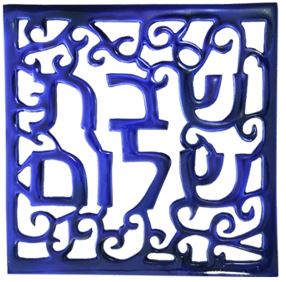
Shared in “A Meal With A Feel,” Onward Israel’s educational pamphlet designed to transform Shabbat dinner into a meaningful experience for all, this post provides poems, stories and short readings to learn together at your Shabbat table, together with discussion questions.
The Sweetness of Learning
Either before the meal or after the meal over dessert, madrichim and participants can lead a short  learning sessions. Feel free to remove pieces and add your own.
learning sessions. Feel free to remove pieces and add your own.
You could even choose a particular reading to begin a particular course at the meal.
One suggestion – prepare a variety of quotations and texts on slips of colored paper. Fold each quotation of text around a candy or date or some other tasty treat. Put the readings in a bowl in the center of the table and invite people to take a treat – and read the text aloud. See if a particular quotation or text sparks a conversation.
Suggested Readings
Light a Candle By Zelda
Light a candle,
drink wine.
Softly the Sabbath has plucked
the sinking sun.
Slowly the Sabbath descends,
the rose of heaven in her hand.How can the Sabbath
plant a huge and shining flower
in a blind and narrow heart?
How can the Sabbath
plant the bud of angels
in a heart of raving flesh?
Can the rose of immortality grow
in a generation enslaved
to destruction,
a generation enslaved
to death?Light a candle!
Drink wine!
Slowly the Sabbath descends
and in her hand the flower,
and in her hand
the sinking sun.
Translation: 2004, Marcia Lee Falk
From: The Spectacular Difference
Publisher: Hebrew Union College, Cincinnati, 2004.
Questions to “Chew Over”
- In a world where we are almost always surrounded by electric lights, is there something particularly meaningful or symbolic in match-lit candles?
- Why do so many religions and cultures light candles as part of their sacred moments?
- Zelda speaks that the Shabbat ‘plants the buds of angels?’ What do you think she means by this phrase? How can we bring the angelic into our own lives?
Shabbat as a Personal and Spiritual Renewal
An artist cannot be continually wielding his brush. He must stop at times in his painting to freshen his vision of the object, the meaning of which he wishes to express on his canvas. Living is also an art. We dare not become absorbed in its technical processes and lose our consciousness of its general plan… Shabbat represents those moments when we pause in our brushwork to renew our vision of this object. Having done so we take ourselves to our painting with clarified vision and renewed energy.
Mordecai Kaplan, The Meaning of God In Modern Jewish Religion (Wayne State University Press), 1994.
Questions to “Chew Over”
- When do I feel like that I need to “unplug and recharge” my life?
- What are the personal rituals and customs that you use to ‘unplug and recharge”?
- Think about Shabbat in Israel. In what kinds of ways do Israelis (both so-called religious and so-called secular) “unplug and recharge” over Shabbat.
- What are the differences between the Shabbat atmosphere back home and that in Israel?
The Sense of Shabbat
Rebbe Elimelech and Rebbe Zusya both sensed the sanctity of the Shabbat from its arrival until its departure, and particularly when the Hassidim sat together at the Shabbat table and shared Torah between them. It once happened that the two rabbis happened to be in the same place together.
Rebbe Elimelech said to Rebbe Zusya, ‘My brother, I am sometimes gripped by terror when I consider that perhaps the sanctity of the Shabbat is not real but rather only imagined. If that is so, my own worship of the Divine is also only imagined – not real.”
“My brother,” replied Zusya, “I am also periodically struck by the same terror.” “What shall we do?” asked Elimelech
Zusya said, “Each one of us should celebrate the Shabbat and her special meals to the smallest detail on a regular work day. We should sit with our Hasidim and share with each other words of Torah. If we feel the sanctity of the Shabbat even on a regular work day, we will know that our way has been mistaken. And if we feel nothing, it is a sign that our way is true.”
And thus they did. On a regular work day they hosted a Shabbat banquet. They dressed in their Shabbat clothing. They wore their Shabbat Shtreimel* (the special fur brimmed hat included in the distinctive dress of Shabbat among certain Hasidim). And they sat among their Hasidim and together shared words of Torah. Their hearts were instantly overcome by the sanctity of the Shabbat as if it was in fact Shabbat.
When the two met again Rebbe Elimelech asked, “So my brother, what are we to do?”
Rebbe Zusya replied, “Let us travel together to our teacher, the Maggid of Mezritch.”
They traveled to Mezritch and shared with their Rebbe the issue that weighed on their hearts.
The Maggid said to them, “If you wore special clothing for the Shabbat, and if the Shtreimel adorned your heads, then by all right and law you felt the sanctity of the Shabbat, for special Shabbat clothing and the Shtreimel have the power to bring to earth the sacred aura of the Shabbat. You have nothing to fear at all.”
From: The Hidden Light, Martin Buber, p. 224, Shocken Publishing.
*According to Rabbi Aaron Wertheim, Rabbi Pinchas of Koretz (1726–1791) stated, “The acronym for Shabbat is: Shtreimel Bimkom Tefillin — the shtreimel takes the place of tefillin.” [Halakhot V’halichost B’Hasidut, p. 196] Since wearing special clothing on Shabbat is a form of sanctification, among the Hasidim of Galicia and Hungary, the shtreimel is associated with the holiness of Shabbat, a crown such as that worn by royalty, which enhances and beatifies Shabbat.
Questions to “Chew Over”
- What creates holy times and places?
- How can we see holiness? How can we act our holiness?
- What is holy for you?
- Is holiness just “religious” or can non-believers can have holiness in their lives as well?
Prayer / Lea Goldberg
Teach me to pray and to bless you for all.
For the ripening fruit and the fading in Fall.
For the freedom to breathe and to sense and to hold and to know and to wish and to fly and to fold.Teach me to sing you the songs of your praise for the cycling of moon and the opening days so that each of my moments for ever be new, so that each of my moments will always be true, so that each of my moments I walk here with you.
English Translation/Interpretation by Orit Perlman
Questions to “Chew Over”
- What is a prayER for you?
- Do you pray? When did you pray last?
- Is praying only for “believers”?
- Are a wish and a prayer the same thing?
Bless It (the day) With Delicacies
Rabbeinu (Rabbi Yehudah/Rebbi) made a feast for Antoninus on the Shabbat. They brought before him prepared foods that were cold. He ate from them and found them very tasty. He (Rebbi) made a feast for him (Antoninus) on a weekday and brought before him steaming foods. He (Antoninus) said to him (Rebbi) those (the cold food on Shabbat) tasted better to me than these (warm foods). He (Rebbi) explained that the warm weekday food was missing a single spice. He (Antoninus) said to him, ‘and is there anything in the king’s treasury that is lacking? He (Rebbi) said that the food was missing Shabbat, Do you have Shabbat?
Breshit Rabba 11
Questions to “Chew Over”
- What changes an everyday meal into a feast?
- Do you have a memory of a special meal – with friends or family, at home or away – that made an impression on you? What was it that made that meal unique and memorable?
- Do you have a Shabbat spice of your own?
He who is full of joy is full of love. The Baal Shem Tov



